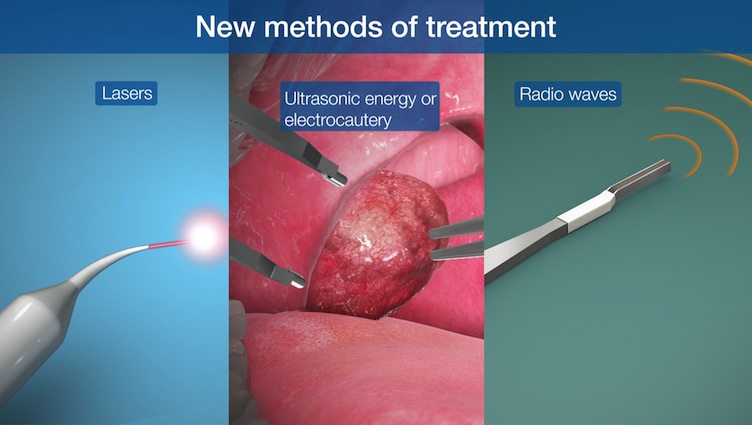What are tonsils?
At the back of your throat, two masses of tissue called tonsils act as filters, trapping germs that could otherwise enter your airways and cause infection. They also produce antibodies to fight infection. But sometimes the tonsils themselves become infected. Overwhelmed by bacteria or viruses, they swell and become inflamed, a condition known as tonsillitis. The condition is usually treated through tonsillectomy.3D Medical Animation - Normal vs Infamed Tonsils with Symptoms
Tonsillitis is common, especially in children. The condition can occur occasionally or recur frequently. In children, symptoms may also include Nausea, Vomiting and Abdominal pain.What are the causes of Tonsillitis?

Left: Streptococcus (strep) bacteria; Right: Tonsils causing viruses
Bacterial and viral infections can cause tonsillitis. A common cause is Streptococcus (strep) bacteria. Other common causes include:- Adenoviruses
- Influenza virus
- Epstein-Barr virus
- Parainfluenza viruses
- Enteroviruses
- Herpes simplex virus
What are the treatments available for Tonsillitis?
Treatment for tonsillitis will depend in part on the cause. To determine the cause, your doctor may perform a rapid strep test or throat swab culture. Both tests involve gently swabbing the back of the throat close to the tonsils with a cotton swab. A lab test can detect a bacterial infection. A viral infection will not show on the test, but may be assumed if the test for bacteria is negative. If tests reveal bacteria, treatment will consist of antibiotics to cure the infection. Antibiotics may be given as a single shot or taken 10 days by mouth. Although symptoms will likely improve within two or three days after starting the antibiotic, it's important to take all of the medication your doctor prescribes to make sure the bacteria are gone. Some people need to take a second course of antibiotics to cure the infection. If the tonsillitis is caused by a virus, antibiotics won't work and your body will fight off the infection on its own.How is tonsillitis treated?
Treatments for tonsillitis vary from doing nothing to surgically removing the tonsils (tonsillectomy). When caused by a virus, Tonsillitis often goes away in a few days and treatments are designed to manage symptoms. This includes gargling salt water, drinking warm liquids such as tea and broth, sucking on lozenges, and taking over-the-counter pain killers such as acetaminophen. For bacterial tonsillitis and strep throat, treatment generally consists of antibiotics such as penicillin or erythromycin. The most serious and invasive treatment is tonsil removal, or tonsillectomy. This is only recommended when a doctor finds something seriously wrong with the tonsils such as long-lasting recurring infections that do not respond to other treatments. Adults with recurrent sore throats may benefit from having a tonsillectomy in the short term, but the overall longer term benefit is still unclear. An adeno-tonsillectomy, which provides improvement in the upper airway of children, may in turn lead to improvement of the lower airways of children, especially those with bronchial asthma.
Is a surgery required for tonsillitis?
Tonsils are an important part of the immune system throughout life, so it is best to avoid removing them. However, if tonsillitis is recurrent or persistent, or if enlarged tonsils cause upper airway obstruction or difficulty eating, surgical removal of the tonsils, called tonsillectomy, may be necessary. Most tonsillectomy procedures involve using a conventional scalpel to remove the tonsils; however there are many alternatives to this traditional method. Increasingly doctors are using techniques such as lasers, radio waves, ultrasonic energy, or electrocautery to cut, burn, or evaporate away enlarged tonsils. As with all surgeries, each of these has benefits and drawbacks. When considering the procedure, it's important to discuss your options with the surgeon to select the most appropriate one for your child.What are the precautions to be taken when having tonsillitis?
You need to take:- Rest
- Pain relievers; Paracetamol ( stronger pain killers may be necessary with advice from your doctor)
- Adequate water/ liquids
- Medication as prescribed even if the symptoms improve in two to three days
What are the precautions to be taken after tonsillitis surgery (tonsillectomy)?
- Avoid going to crowded places for 10 days
- Take food and adequate liquids
- Pain relievers that you need to take regularly will be precribed
- If there is high fever or bleeding from the throat, see your doctor immediately
- Have a check-up in two to four weeks








